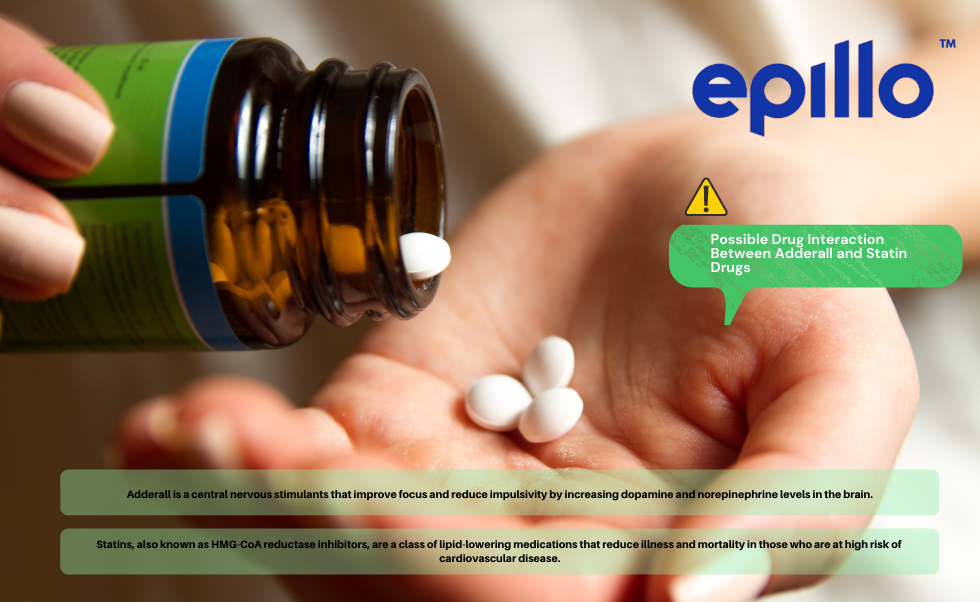Around 40% of the U.S population receive prescriptions for four or more medicines, due to which there is a drastic increase in potential drug interaction and its adverse effects.
Adderall is prescribed medicine to treat attention-deficit hyperactivity disorder (ADHD) and narcolepsy. Adderall is a combination of two central nervous system (CNS) stimulants, amphetamine and dextroamphetamine. This drug belongs to the class of medicines called stimulants.
Statins help to lower the levels of cholesterol in the blood by reducing the production of cholesterol. It blocks the enzyme in the liver that is responsible for making cholesterol.
When these drugs are taken together; potential drug interactions may lead to several severities such as myopathy, rhabdomyolysis, and myoglobinuria. Hence, take these medicines only on your doctor’s advice.
This article helps you to understand what Adderall and statin drugs are, how they work, and the potential drug interactions between them.
What is Adderall, and How Does it Work?
Adderall is an FDA- approved drug. It is available only on the prescription of a registered doctor. It is the first line of treatment for ADHD.
Studies have shown that it has helped to improve attention and focus and reduces impulsive behavior. Around 75 to 80% of children with ADHD have seen improved symptoms with Adderall.
Adderall is also used to treat narcolepsy; studies have shown that it has increased daytime wakefulness in people with narcolepsy.
Studies also suggest that people with ADHD lack normal levels of neurotransmitters and have dopamine dysfunction. As Adderall mainly contains amphetamine and dextroamphetamine, they act as central nervous system stimulants. They affect the nerves and chemicals in the brain that contribute to hyperactivity.
Dopamine belongs to the family of catecholamines, and it is synthesized by nervous tissue and the adrenal gland; it plays a vital role in motor control, motivation, arousal, and emotional responses.
Adderall enhances the availability of neurotransmitters such as dopamine and norepinephrine in your brain. These chemicals are responsible for increased alertness and attention. It also brings a calming effect during ADHD.
What is a Statin, and How Does it Work?
Statins belong to the class of drugs that reduces the production of cholesterol by the liver. It blocks the enzyme which produces cholesterol. Statins are also known as HMG-CoA (hydroxy-methyl glutaryl-coenzyme A) reductase inhibitors.
When cholesterol production is increased in the cells, it will lead to the development of atherosclerosis; cholesterol-containing plaques form within arteries. These plaques block the arteries and reduce the blood flow to tissues. When these plaques rupture, a blood clot is formed, which leads to blockage in the artery. This condition leads to several health problems such as heart attack and angina.
Statins reduce the production of cholesterol, slows the formation of new plaques, and helps to reduce the size of plaques that are already present. Although the mechanism of the statins is less studied, it is believed that it may stabilize plaques and make them less prone to rupture and develop clots.
According to research studies, statins are inhibitors of hydroxymethylglutaryl-CoA (HMG-CoA) reductase, which plays a significant role in cholesterol synthesis. Generally, statins are recommended in the treatment of atherosclerosis, myocardial infarction, and stroke. However, frequent monitoring of the patient is advised while taking statins, as these drugs are known to cause various adverse effects and drug interactions.
What are Potential Drug Interactions Between Adderall and Statin Drugs?
According to a report on medication safety issued by Institute for safe medication practices, 2 out of 3 patients who visit a health care provider or doctor have been prescribed at least one medicine. Most of the time the patients are advised with 3 or more drugs; usage of more drugs leads to drug interaction and its adverse effects.
Adderall can interact with several other drugs, food, and certain supplements as well. These interactions may lead to different effects. For example, some of the medicines may enhance the effect of the drug, some drugs reduce the impact, and sometimes drug-drug interactions may lead to several side effects.
When you are on Adderall drugs, and if you take statins, this combination may lead to several health complications such as;
1. Rhabdomyolysis
According to the federal drug regulators, medicines such as Adderall, Concerta , and Ritalin which are used to treat ADHD, can cause severe muscle injury and kidney damage leading to Rhabdomyolysis.
Rhabdomyolysis is a well-documented side effect caused due to statin therapy. This risk is increased when you are on drugs that inhibit monoamine oxidases.
Rhabdomyolysis is a side effect that has been linked with drug-drug interaction. It causes muscle fibers to break down, which releases a protein, myoglobin; this protein damages the kidney.
Patients under Zocor (simvastatin, a cholesterol-lowering drug) take Zocor at higher doses above 20g while they are under antidepressants or ADHD, or Cordarone drug, the risk of developing rhabdomyolysis would be very high. This can vary in severity and can be fatal too. Consult your physician before taking any medications while you are on Adderall drugs.
2. Cardiovascular complications
Adderall is a prescribed CNS stimulant drug for ADHD and is recommended for all age groups. Although the exact mechanism of cardiovascular impact of ADHD drugs is not well studied. Some of the studies suggest that Adderall increases the risk of cardiovascular events such as increased blood pressure, heart rate and improved circulation of catecholamines inducing vasospasm and increases inflammation.
When Adderall is taken with a statin drug, it may be beneficial because statins are the prescribed drugs to lower the risk of heart attack, stroke, and death in those with high risk for heart diseases.
Hence it is crucial to consult your doctor while you are on 2 to 3 drugs at the same time; ask your doctor regarding the drug-drug interactions.
Some Tips to Avoid Drug Interactions
- Take the drugs that are prescribed by your doctor
- Learn about the side effects of all drugs you take
- Ask your doctor what type of drugs, foods, and supplements to be avoided when you are taking these drugs
- If you experience any adverse effects, report them to your doctor immediately
- Tell your healthcare provider the list of medicines you are taking
Final Words
When you are prescribed one or more drugs for your illness or if you are on long-term drug therapy due to any chronic disease, understanding these drug interactions is essential. While visiting your doctor for any medical help make sure to tell them about the medications you are already taking to avoid any potential drug interactions.
Always follow prescription and doses as advised by your healthcare provider; if you find any allergic reactions or symptoms consult your doctor immediately.


